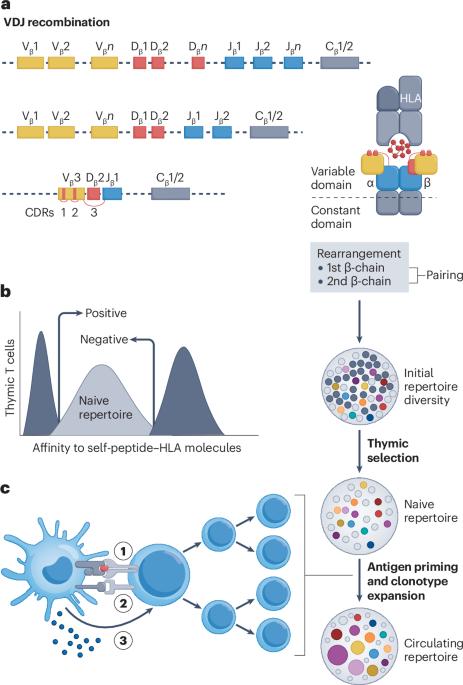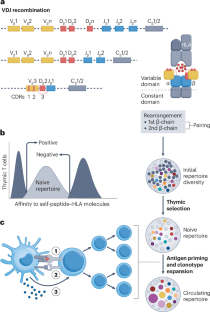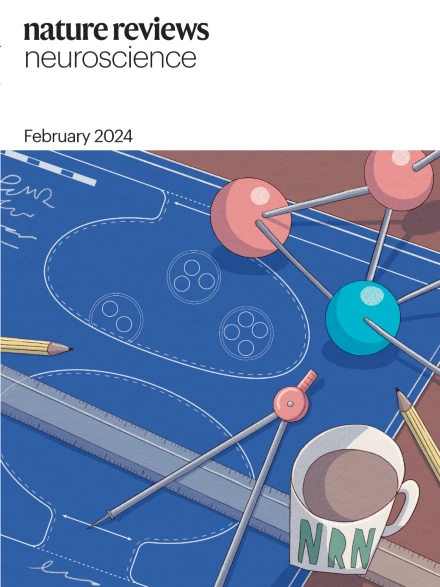风湿病中的抗原驱动T细胞反应:来自T细胞受体库研究的见解
IF 32.7
1区 医学
Q1 RHEUMATOLOGY
引用次数: 0
摘要
T细胞受体(TCR)分析技术的进步极大地提高了我们研究T细胞对HLA I类和II类分子上抗原的反应以及自身免疫T细胞与风湿性疾病之间关系的能力。轴性脊柱炎(axSpA)的早期研究发现了与疾病相关的T细胞克隆型,这得益于该疾病的相对遗传同质性。然而,在其他风湿性疾病中,遗传和T细胞免疫景观都更为复杂。TCR库的多样性或冗余、抗原表位在疾病期间的扩散、HLA基因或其他位点的遗传异质性以及与疾病发病机制和持续炎症有关的抗原表位的多样性都可能导致这种复杂性。TCR分析有望识别关键抗原驱动因素和表型T细胞状态,维持风湿病的自身免疫。在这里,我们回顾了在axSpA和其他慢性炎性风湿病(包括银屑病关节炎、类风湿性关节炎、系统性红斑狼疮和Sjögren综合征)中TCR全库研究的主要发现。我们探讨了TCR分析技术,如果应用于早期疾病阶段和遗传同质亚群的更好的对照研究,如何促进疾病监测和针对自身免疫T细胞、其同源抗原或其潜在生物学的治疗方法的开发。本文章由计算机程序翻译,如有差异,请以英文原文为准。


Antigen-driven T cell responses in rheumatic diseases: insights from T cell receptor repertoire studies
Advances in T cell receptor (TCR) profiling techniques have substantially improved our ability to investigate T cell responses to antigens that are presented on HLA class I and class II molecules and associations between autoimmune T cells and rheumatic diseases. Early-stage studies in axial spondyloarthritis (axSpA) identified disease-associated T cell clonotypes, benefiting from the relative genetic homogeneity of the disease. However, both the genetic and the T cell immunological landscape are more complex in other rheumatic diseases. The diversity or redundancy in the TCR repertoire, epitope spreading over disease duration, genetic heterogeneity of HLA genes or other loci, and the diversity of epitopes contributing to disease pathogenesis and persistent inflammation are all likely to contribute to this complexity. TCR profiling holds promise for identifying key antigenic drivers and phenotypic T cell states that sustain autoimmunity in rheumatic diseases. Here, we review key findings from TCR repertoire studies in axSpA and other chronic inflammatory rheumatic diseases including psoriatic arthritis, rheumatoid arthritis, systemic lupus erythematosus and Sjögren syndrome. We explore how TCR profiling technologies, if applied to better controlled studies focused on early disease stages and genetically homogeneous subsets, can facilitate disease monitoring and the development of therapeutics targeting autoimmune T cells, their cognate antigens, or their underlying biology. Garrido-Mesa and Brown review findings from TCR profiling studies in rheumatic diseases and discuss how improved study design might help elicit information about autoreactive T cell clones and their contribution to disease pathogenesis.
求助全文
通过发布文献求助,成功后即可免费获取论文全文。
去求助
来源期刊

Nature Reviews Rheumatology
医学-风湿病学
CiteScore
29.90
自引率
0.90%
发文量
137
审稿时长
6-12 weeks
期刊介绍:
Nature Reviews Rheumatology is part of the Nature Reviews portfolio of journals. The journal scope covers the entire spectrum of rheumatology research. We ensure that our articles are accessible to the widest possible audience.
 求助内容:
求助内容: 应助结果提醒方式:
应助结果提醒方式:


